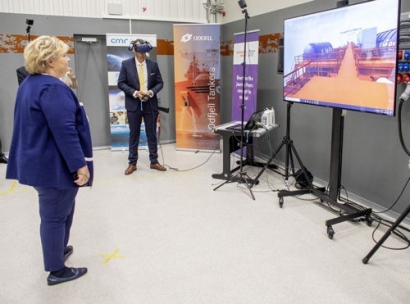
Now the project is constructing a 1.2.MW prototype fuel cell that will be tested at the Sustainable Energy catapult center at Stord, Norway. Then it will be mounted and tested onboard one of Odfjell's newest chemical tankers.
The new technology opens for many different types of fuel, including green ammonia and LNG. With this flexibility, vessels can choose fuel according to availability. The main partners in the project are Odfjell, Prototech, Wärtsilä and Lundin Energy Norway. Odfjell has leading expertise in global shipping, Prototech in fuel cell technology, Wärtsilä in maritime technology and energy, and Lundin Energy Norway in oil and gas.
“Our tests show a CO2 reduction of as much as 40-45% when using LNG, compared to current solutions. Increased efficiency and reduced fuel consumption also provide significant cost savings, and the ship will be able to sail significantly longer on the same amount of energy. The system will also be ready to operate completely emission-free from the locations where, for instance, ammonia is available for bunkering,” says Bernt Skeie, CEO of Prototech.
“The technology also enables direct capture of CO2, which will be yet another alternative for emission-free operation when logistics for CO2 management become available,” Skeie explains.
Around 90% of the world trade is transported by ships. Ship transport is still the most environmentally efficient way of carrying goods, but to achieve Norwegian shipping’s target of becoming climate neutral by 2050, new, energy-efficient solutions must be introduced.
The project aims to develop a technology that can provide emission-free operation over long distances. Battery solutions are currently not suitable for operating ships that sail long distances, the so-called “deep-sea” fleet. This fleet consists of around 50,000 ships globally and thus constitutes a significant share of international shipping. It is impossible to achieve the goal of climate neutrality without finding solutions for this significant segment.
The unique feature of the new technology is its high energy efficiency and the flexibility that enables significant emission reductions already from day one with the use of currently available infrastructure for LNG – while also preparing for emission-free operation in line with the development of value chains and infrastructure for sustainable fuels in the years to come.
“Ships are to be operated for 20-30 years, and we need flexible solutions that can meet future emission requirements. We do not have time to wait, we have to think about zero emissions already now,” says Erik Hjortland, Technology Director at Odfjell SE. “The fuel cell project is one of the paths we are pursuing. We focus on machinery rather than focusing on one single type of fuel. Fuel cell technology gives us flexibility that ensures environmentally efficient operation regardless of fuel changes that may occur in the years ahead.”
“The new energy solution has the potential to take us a big step closer to the goal of climate neutrality. And it does not stop with ships, this solution can also be used in offshore oil and gas operations,” says Ingve Sørfonn, Technical Director in Wärtsilä.
Harald Solberg, CEO of the Norwegian Shipowners' Association, emphasizes the potential this project demonstrates.
“The development of this fuel cell is an example of how forward-looking shipping companies and our unique maritime expertise have the prerequisites to drive new solutions through a broad collaboration within the maritime cluster. In the long run, scaling up such solutions will be of great importance in achieving our climate goals, they will have business value, and they can create new jobs in Norway. Norwegian shipping has set ambitious climate goals. This type of projects is very important for us to be able to develop solutions that quickly reduce emissions.”
PHOTO: VP Technology Erik Hjortland of Odfjell and CEO of Prototech Bernt Skeie present the fuel cell solution for Prime Minister Erna Solberg

